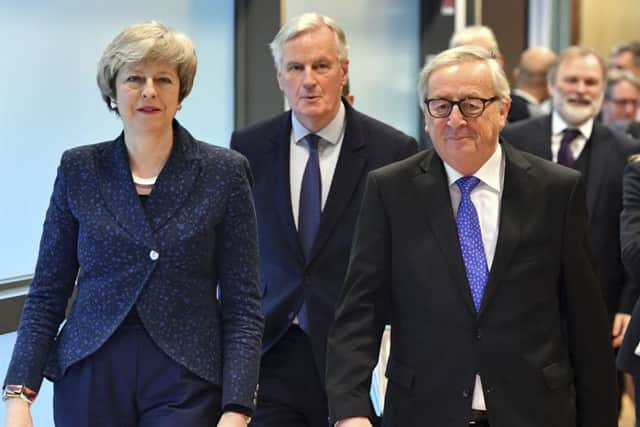Brexit: Tusk backs Corbyn’s ‘promising’ proposal as Brussels trip only yields more talks
The Prime Minister vowed to deliver Brexit on time on 29 March following “robust, but constructive” talks and insisted she was determined to “negotiate hard” over the coming days to secure legally-binding changes to the Brexit divorce deal.
However, she was told by the presidents of the EU’s top institutions, Jean-Claude Juncker and Donald Tusk, that Brussels would not renegotiate the withdrawal agreement. The Prime Minister confronted Mr Tusk over his comment there was “a special place in hell” for those who campaigned for Brexit without having a plan to deliver it, telling the EU Council president his words were “not helpful” and had “caused widespread dismay”.
Advertisement
Hide AdAdvertisement
Hide AdIn return, Mr Tusk is reported to have endorsed an offer from the Labour leader to back a Brexit deal that keeps the UK closely aligned to the EU, including a permanent customs union that could eliminate the need for the controversial Irish border backstop.


Despite being rebuffed in her call for the backstop to be changed, Mrs May did come away from talks in Brussels with a commitment to a further meeting with Mr Juncker before the end of the month.
With EU leaders needing to sign off any change to the withdrawal agreement, and with no gathering of heads of government planned until a joint summit with the Arab League in the Egyptian resort of Sharm el-Sheikh on 25 February, the timetable casts further doubt on a breakthrough by next week, when the Commons is scheduled for a fresh vote on the Brexit deal as well as alternatives suggested by MPs.
Next week is seen as an important deadline for businesses, with products being shipped to Asia taking six weeks to arrive and potentially facing new tariffs in the event of a no-deal. Several Cabinet ministers are understood to be considering resignation if a no-deal Brexit becomes inevitable. Yesterday Scottish Tory MP Paul Masterton warned on social media that “continuing drift is not acceptable”. “The technical/legal deadline for getting a deal, and the practical/real world deadline, are not the same thing,” he said.
Brexit Secretary Stephen Barclay and EU chief negotiator Michel Barnier will meet on Monday. Attorney General Geoffrey Cox, who is working on proposals for a possible end date and exit mechanism from the backstop, will also meet his Irish counterpart Seamus Woulfe in Dublin today. Mrs May will travel to Dublin this evening to hold talks with Irish Prime Minister Leo Varadkar.
Following their encounter, Mr Tusk poured cold water on any expectation of an imminent end to the impasse, saying there was “no breakthrough in sight”.
The European Parliament’s Brexit co-ordinator Guy Verhofstadt raised concerns among eurosceptics in the UK by saying Mrs May had assured him “there will be a backstop” in any final deal. Mrs May was offered a chink of light by German Chancellor Angela Merkel, who said she believed “solutions” could be found.